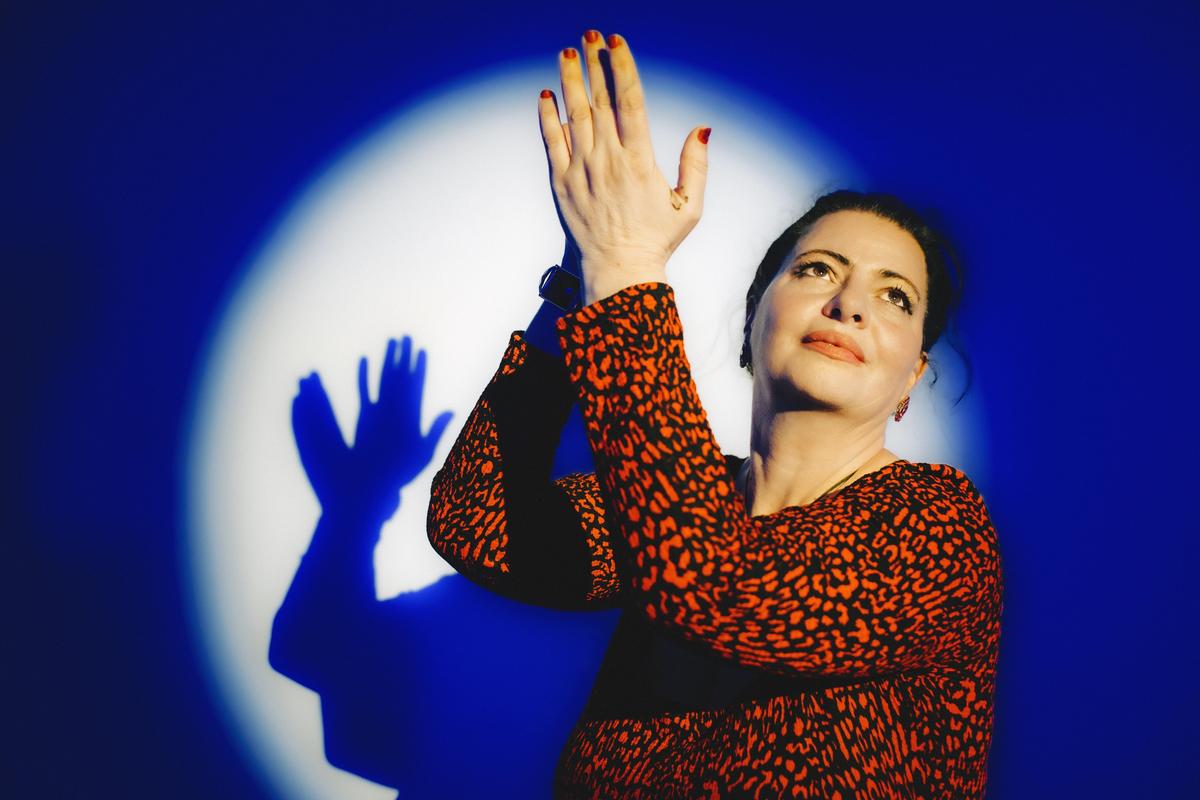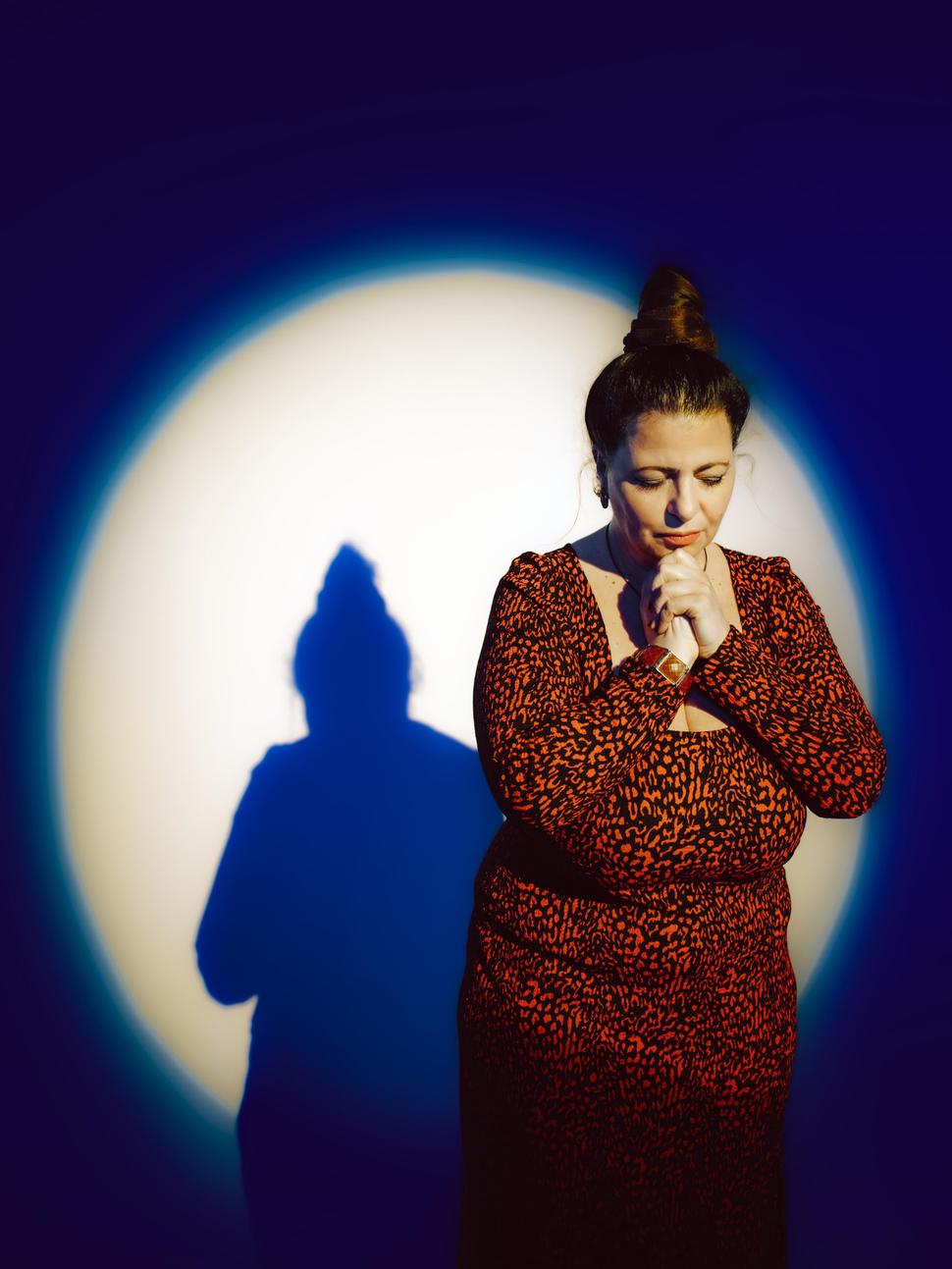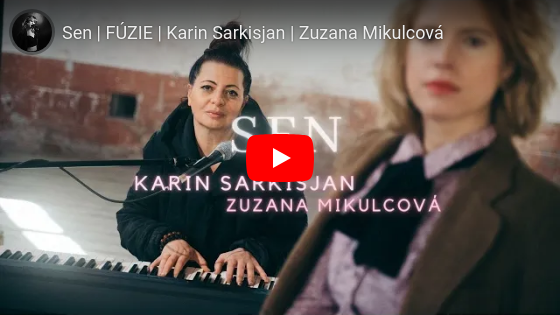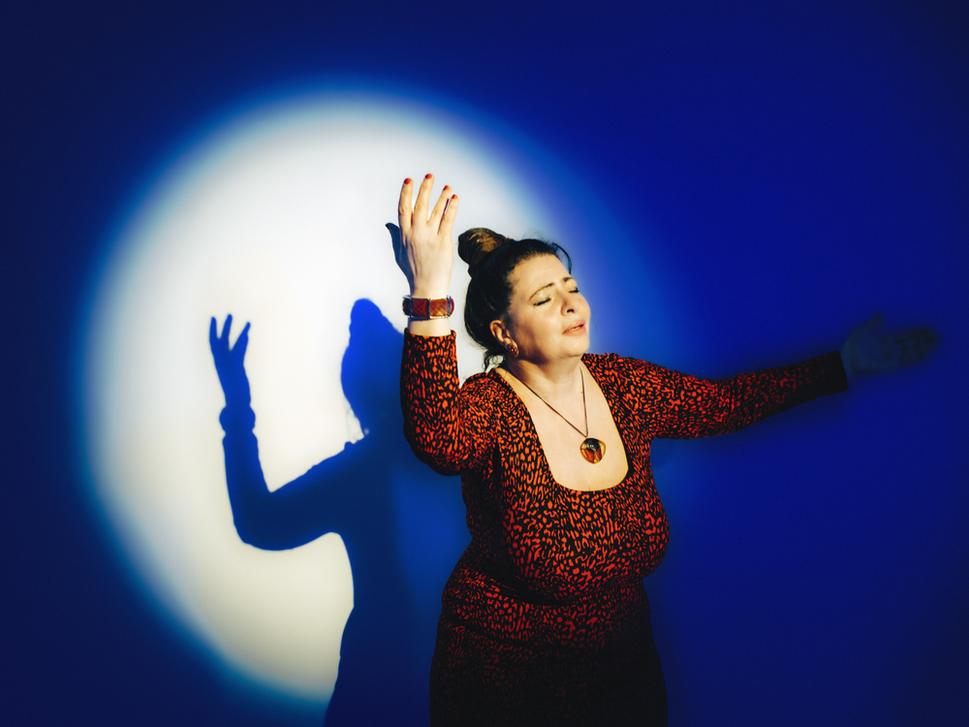The interview was originally published in the magazine fjúžn.
Kristína Paholík Hamárová is a journalist and contributor to fjúžn magazine, named after the festival focused on foreigners and minorities in Slovakia, organised by the Milan Šimečka Foundation. The festival has been held in Slovakia for 19 years.
Karin Sarkisjan is originally from Yerevan. She grew up in Armenia before moving to Slovakia. She holds a degree in composition from the Yerevan State Conservatory, and music a constant throughout her life, even in Slovakia. Alongside her work in world music, she also composes for theatre and works as an accompanist, collaborating with institutions such as the Slovak National Theatre and the Slovak Chamber Theatre in Martin. She has her own project, arranging folk songs from Slovakia, Armenia, and Ukraine for various instruments. As a singer and pianist, she regularly performs with groups such as the Preßburger Klezmer Band, Balkanansambel, Bashavel, Shum Davar, Pacora Trio, and the Kaschauer Klezmer Band. She has appeared at major klezmer festivals in Lviv and St Petersburg. She has two children and lives in Martin.
Where are your roots?
My roots are in Yerevan, Armenia, where I was born and lived for 20 years until I graduated from the conservatory with a degree in composition. After that, I moved to Slovakia.
What do you remember about your life in Armenia?
Very fond memories. Everything I do now has its foundation in Armenia. My entire childhood was intertwined with music studies. I graduated in 1993. In July, I handed in my thesis, and I think it was within the same week that I left for Slovakia with my father.
Why did you decide to leave the country so quickly?
We had poor living conditions, and the economic situation was difficult. Unfortunately, many people left at that time, just like I did, depending on where they had connections. My father was already living in Slovakia with his new family and suggested I stay with him for a while—initially for a year or just the winter.
Did you suspect that your departure would be permanent?
I truly thought it would only be for a year, maybe just for the winter. I came as a "visitor" and I’m still here. It’s turned into quite a 30-year visit.
What made you stay in Slovakia?
I got used to it. I started working right away and gradually adapted. Moreover, the situation in Armenia wasn’t improving, so I had no reason to return.
When you say the situation in Armenia was bad, that was in 1993, shortly after the collapse of the USSR. What specifically was threatening you?
The conditions for living the life we were used to just weren’t there. In the year I left, there was a blockade. We had no electricity, no water—not even cold water. These are basic living conditions. I lived like that for a year, and when the opportunity to leave arose, I took it.
How did you feel about leaving the country?
I barely had time to realise it; there were no grand emotions. I was young and had the mindset that I had to endure wherever I went, even if it was a different country, with different conditions and a different life. I knew it would be better, and I was always in contact with my family, at least by phone.
Looking back, was there anything that might have deterred you from leaving?
No. My father and I agreed that I would complete the last two years of my studies in one year so that we wouldn’t have to wait any longer. It was so intense that I didn’t have time for deeper reflection.
Did you know much about Slovakia or Czechoslovakia? 1993 was quite a pivotal year.
I arrived in Slovakia six months after its creation, knowing very little about it. I knew more about Czechoslovakia, which was spoken of highly back home. It was a favoured country. So, there were plenty of new things to learn and adapt to.
You found a job at the conservatory in Žilina. Was that your first job in Slovakia?
I did some other work before that, but I’m too embarrassed to say.
Everyone starts somewhere.
I worked in a shop to learn Slovak. Sometimes it led to very humorous situations. Some words completely stumped me. For instance, when someone asked for matches, I went to cut cheese into small pieces. Or when someone asked for "čalamáda" (pickled vegetables), I said we didn’t have it, but the customer pointed out it was right behind me. Situations like these were quite common, and it wasn’t ideal.
How did you adjust to the Slovak language?
It turned out to be fairly simple. I had the advantage of my father’s son being a first-grader at the time. We studied together, did homework, wrote, and read. The age difference disappeared, and within six months, I learned to speak Slovak quite well. My father also helped me.
This made it easier for me at the conservatory. By November, I had already started accompanying in Žilina. Later, I auditioned for the ballet accompaniment in the opera in Banská Bystrica, but my father suggested I try Martin since it was closer to home. I’ve been in Martin ever since.
And what job did you find in Martin?
I taught music at the local arts school. Honestly, I think I might have enjoyed the freer style in Banská Bystrica more. But I didn’t only stick to teaching. After eight years in Martin, I auditioned for the Dance Conservatory in Bratislava as a ballet accompanist. I packed my bags and went.
That’s where my significant career started, I believe, in terms of musical growth. Everything I’ve drawn upon since began in Bratislava. I was offered to sing with the Preßburger Klezmer Band and began my solo projects.
In Martin, I was more of a "little chick", observing everything, singing only in a choir.
Besides the Dance Conservatory, you also worked at the Slovak National Theatre in Bratislava, right?
Yes, I was an accompanist for the ballet for a while. Later, I had the opportunity to accompany drama performances, specifically for Mother Courage and Her Children, directed by Martin Čičvák. I had met him at the Martin theatre, and that was one of my happiest periods.
It's interesting that you began your life in Slovakia in smaller towns. Most foreigners head straight for the capital, as it’s harder to make a name for yourself outside of it. Do you think that music made it easier for you as a foreigner to integrate here, even outside the larger cities?
It’s always easier for a foreigner to start a new life in the capital. But unfortunately, my father didn’t settle in Bratislava but in Žilina. Of course, there were difficulties, but music helped me to cope better. It was a tough time for us, and after three years, my mother also moved here.
It was especially hard to prove that we were just normal people and that we weren’t doing anything wrong. And this was back in the '90s. Everyone has something to offer; we wanted people to understand us. In the capital, it’s generally more international, there are bigger foreign communities, and that sense of 'otherness' fades away.
I didn’t stand out as much in Bratislava, but in Martin, I was a spectacle. Quite literally, a “white crow” (laughs).
Moreover, Martin is a town where key moments in Slovak history were shaped.
Yes, for me, as a foreigner, it was hard to start and first prove that we were normal people, and then that I could make a name for myself as a musician. But it’s still tough today, as we all know how things are in Slovakia when it comes to culture. It’s simply easier to do it in the capital rather than "wasting time" in smaller towns.
Why did you return to Martin from Bratislava after a few years?
For financial reasons. In the meantime, I bought a flat here. Everything was expensive in Bratislava, and I also got married because I decided I couldn’t just keep singing and dancing – I needed to have children (laughs). We simply couldn’t afford life in Bratislava.
So, I slightly "stepped back" in my career, but I was happy to have children. And paradoxically, the most beautiful and happiest time of my life was here. Simply put, I planted my roots in Martin, at the Martin hospital. I have two little rascals who are continuing my legacy.
For about five or six years, I stepped away from music and lived for motherhood. Now, I’m getting back into my "musician mode" and working again at the acting conservatory. I was looking for something that would fulfil me musically, but at the same time, allow me to be with my family. I had to find a compromise, which I did fairly well because I work in a free, improvisational style but still as an accompanist. And on top of that, I create my own music.
You mentioned that you "planted your roots in Martin". Are they firmly planted here?
It’s hard to say. My children are now 11 and 13 years old, so for now, we’re here. They certainly have roots in Slovakia, which won’t change, but where they’ll go in the future, I don’t know. Opportunities are opening up for us, horizons expanding, and young people are going abroad to study, so it’s all open.
Your husband is Armenian as well…
Yes, he’s Armenian, and his name is Armen.
So, do you speak Armenian at home?
Yes, we mostly speak Armenian, but often Slovak, too. I’d love for our children to start speaking it more. They understand and can say simple sentences but with some difficulty. Perhaps if they were more immersed in an Armenian environment, the language would come more naturally. But since they speak only Slovak at school and nursery, it’s tough.
Do you still have any family in Armenia?
Since my mother moved here, all my close family are here. We still have an aunt, cousins, and relatives we keep in touch with online. I haven’t been back for a long time – not since my wedding. I’ve become a bit of a coward when it comes to flying.
Did you have your wedding in Armenia?
No, we had it here in Martin, at the Turiec Gallery. We got engaged in Armenia.
Did you incorporate any Armenian traditions into your wedding?
No, we fully adapted to Slovak traditions.
Is there a larger Armenian community here that you meet with?
Not in Slovakia, and certainly not in Martin. A few people live in Bratislava. But for example, in Vienna, there are more of us, and we even have an Armenian church there.
But I don’t meet with the Armenian community much. When I lived in Bratislava, I worked as an accompanist for a very talented Armenian couple at the Slovak National Theatre. The husband was the principal ballet master, and the wife used to teach at the dance conservatory. I spent some time with them.
In your world music production, you collaborated with the well-known singer Zuzana Mikulcová. Just a few months ago, you released a song titled Sen (Dream). How was it working with such an established Slovak artist?
It was great. Zuzana is brilliant, with the right drive and a wonderful tone. It was for her project, which was a lovely fusion as well. Every month, she worked on a song with a foreigner, and I was one of them. I wrote the lyrics and the music. I sing the first verse in Armenian, and Zuzka sings the second in Slovak, and we recorded it in the synagogue in Bytča. It was truly a beautiful collaboration.
I must say that I really enjoyed this connection and style. Many people probably see me as a world music or ethno music artist, but I have various tastes, even for pop. If such an offer came along, I’d gladly take it. Not to sing pop, but to take on the role of a composer.
Are you familiar with Slovak pop music?
Yes, I keep an eye on it. There are singers who have good vocal and compositional skills, and then there are those who just ride the wave. For me, quality means a well-done melody and arrangement.
Do you have favourite Slovak singers or performers?
Of course, I like Zuzka. I prefer musicians with formal training because if they’re not trained, how can they understand the structure of a composition, the melody, or harmonies? You can’t make music with just three chords.
I also quite like that new guy from Czech & Slovak Idol, Adam Pavlovčin. I’m not sure if he writes or composes, but the songs are good. I like Martin Harich’s voice, with that slight rasp. In world music, I think Andrea Bučko is excellent, and I believe we’ll soon be performing together at a concert. And then there’s Barbora Botošová. Or Jana Kirschner, who dabbled in world music when she moved to England and is, in a way, a foreigner like me.
For a creator, I think it’s very enriching to live abroad for some time – it broadens their perspective and allows them to grow. It never hurt anyone. You see new things and open yourself to possibilities.
When you say you arrange folk songs, it’s not just Slovak ones but also Armenian, Ukrainian, and Jewish folk music.
Exactly. I’ve done Russian songs before as well.
One piece from your repertoire that stood out to me is the traditional Armenian song Sareri Hovin, which is very moving. What does it mean to you?
Exactly as you said, that song touches the heart. Not just mine, but really everyone’s – I’ve had great feedback on it. I get a lot of positive responses to my Armenian songs in general.
I worked on this track with an excellent jazz violinist from Martin, who is also my colleague at the local music school, Ľuboš Šamo. He has a special device for his violin and can really bring the song to life.
In translation, it means “I love the scent of the mountains”. It’s about love, saying that every time her beloved passed by on his way down from the mountains, she would remember the breeze she felt.
So you combine folk songs with world music. Do you have a specific corner of the world you enjoy bringing to your work?
I take inspiration from everywhere but always draw from my experiences and musical abilities. I love being inspired by any world music, but I want it to always have my signature on it.
Is there something specifically Armenian that you bring to your music, aside from working on an Armenian song?
I incorporate certain notes that are characteristic of the region around Armenia, Iran, Syria, or Israel.
Music in these areas is unique, different from European music. It has a distinct flavour that blends well with world music. For example, different trills, melismas, or the major second interval. I love it. And you always have to dance a bit to it – that’s when it creates the right atmosphere.
For me, it has this kind of "oriental flavour"...
Yes, exactly. Even though we can't quite define what "oriental" is, you can definitely hear that it’s beyond Slovakia’s borders. From Georgia onwards, the flavours start to change – in the music, the food, and the way people behave. It’s a certain warmth, full of strong emotions. Even when I’m singing a joyful song, it all comes through with emotion and a tinge of melancholy.
Yes, you mentioned that this sense of melancholy in music also drew you to the Preßburger Klezmer Band. Do you have any Jewish roots?
Not at all, but for me, the roots of the music are what’s important. The country, the music, and the creativity are similar to ours, so the music just feels close to me. The emotion is the same, and I don’t really think about where it comes from.
Do you think this sadness and melancholy might be connected to what’s currently happening in Armenia?
Absolutely, the current situation weighs heavily on me. Last year, things were very uncertain. It’s not something we can just ignore, and it affects every Armenian. I feel sorrow, but I can’t grieve for 30 years. Here, I’ve built a little bubble where I find joy – my children, my work, and music. But of course, my soul and memories are still there, and they’ll never leave.
Do you ever consider returning to Armenia?
No, not really. I’ve become a bit of an alien who doesn’t truly belong anywhere. Even when I was still going to Armenia, people would ask where I was from, because my mindset, behaviour, and even my language had shifted – it was no longer purely Armenian.
And when I’m in Slovakia, people always ask where I’m from. So, I’m somewhere in between – a "true foreigner". A foreigner in both countries. I have two homes, two countries, and two sets of close people.
Inside me, there are literally two people – the young Karin, a 20-year-old Armenian, and the one who continued her life’s journey here in Slovakia. Both are meaningful to me, both have their place, and I respect and value them equally. I’m rich in that sense and have no complaints.
© [fjúžn] magazine

 Karin Sarkisjan is originally from Yerevan. She grew up in Armenia before moving to Slovakia. (source: Soňa Maletz Nosáľová)
Karin Sarkisjan is originally from Yerevan. She grew up in Armenia before moving to Slovakia. (source: Soňa Maletz Nosáľová)
 Alongside her work in world music, Karin Sarkisjan also composes for theatre and works as an accompanist, collaborating with institutions such as the Slovak National Theatre and the Slovak Chamber Theatre in Martin. (source: Soňa Maletz Nosáľová)
Alongside her work in world music, Karin Sarkisjan also composes for theatre and works as an accompanist, collaborating with institutions such as the Slovak National Theatre and the Slovak Chamber Theatre in Martin. (source: Soňa Maletz Nosáľová)

 "I love being inspired by any world music, but I want it to always have my signature on it." (source: Soňa Maletz Nosáľová)
"I love being inspired by any world music, but I want it to always have my signature on it." (source: Soňa Maletz Nosáľová)